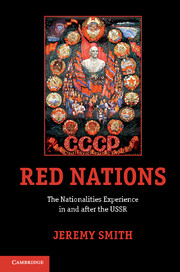Book contents
- Frontmatter
- Dedication
- Contents
- Tables
- Preface
- 1 Introduction: the prison-house of nations
- 2 Dispersal and reunion: revolution and civil war in the borderlands
- 3 Bolshevik nationality policies and the formation of the USSR: the Bolsheviks dispute national policy
- 4 Nation-building the Soviet way
- 5 Surviving the Stalinist onslaught, 1928–1941
- 6 The Great Patriotic War and after
- 7 Deportations
- 8 Territorial expansion and the Baltic exception
- 9 Destalinisation and the revival of the republics
- 10 Stability and national development: the Brezhnev years, 1964–1982
- 11 From reform to dissolution, 1982–1991
- 12 Nation-making in the post-Soviet states
- 13 The orphans of the Soviet Union: Chechnya, Nagorno Karabakh, Abkhazia, South Ossetia and Transdniester
- Conclusion
- Bibliography
- Index
- References
4 - Nation-building the Soviet way
Published online by Cambridge University Press: 05 June 2014
- Frontmatter
- Dedication
- Contents
- Tables
- Preface
- 1 Introduction: the prison-house of nations
- 2 Dispersal and reunion: revolution and civil war in the borderlands
- 3 Bolshevik nationality policies and the formation of the USSR: the Bolsheviks dispute national policy
- 4 Nation-building the Soviet way
- 5 Surviving the Stalinist onslaught, 1928–1941
- 6 The Great Patriotic War and after
- 7 Deportations
- 8 Territorial expansion and the Baltic exception
- 9 Destalinisation and the revival of the republics
- 10 Stability and national development: the Brezhnev years, 1964–1982
- 11 From reform to dissolution, 1982–1991
- 12 Nation-making in the post-Soviet states
- 13 The orphans of the Soviet Union: Chechnya, Nagorno Karabakh, Abkhazia, South Ossetia and Transdniester
- Conclusion
- Bibliography
- Index
- References
Summary
In creating the USSR and a series of autonomous territories, the Bolsheviks had put territoriality at the heart of their nationality policy. But the course of the debates leading up to this had further implications. As the struggle between ‘National Lefts’ and ‘National Rights’ developed in the course of 1922 and 1923, the Rights came out, by and large, on top at the centre and thereby in the peripheries. Delegates returned from the June 1923 special conference to their republics and regions armed with a clear mandate to continue and deepen the process of national consolidation and nation-building. They set about this task with a will, and enlisted national intellectuals and cultural producers in the project. Where they proved insufficiently strong to override the objections of (mostly Russian) local Party members and officials, they were able to call on the centre to support them. While support usually was forthcoming, it was still not always sufficient to overcome opposition. The process of nation-building was, therefore, accompanied by political and, occasionally, violent struggle. Meanwhile, nationalist or religious opponents of Bolshevism continued to try to undermine Soviet rule, occasionally by open rebellion. The policies of korenizatsiia and nation-building were therefore being squeezed from two directions, but ultimately prevailed. In a short period of time, by the end of the 1920s people who had not really thought in national terms before the First World War found that they now had a national language, a national culture, national histories and national political structures – in short, they had become members of a nation.
- Type
- Chapter
- Information
- Red NationsThe Nationalities Experience in and after the USSR, pp. 73 - 96Publisher: Cambridge University PressPrint publication year: 2013
References
- 1
- Cited by



